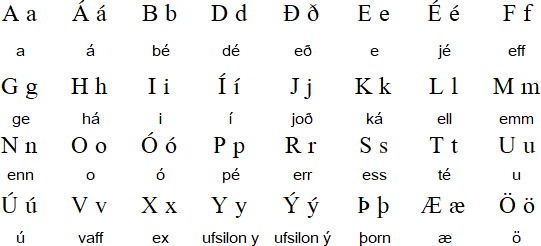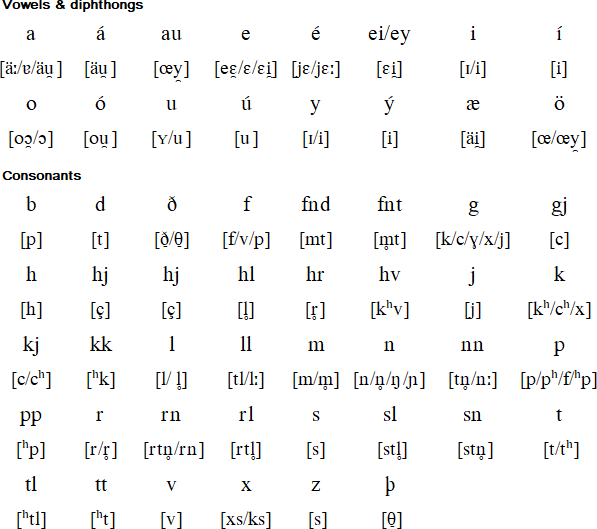Icelandic is a Northern Germanic language spoken mainly in Iceland (Ísland), and also in Canada (Kanada) and the USA (Bandaríki Norður-Ameríku).
In 2017 the population of Icelandic was 338,349 [source], the vast majority of whom speak Icelandic. In 2013 there were approximately 15,000 native speakers of Icelandic outside Iceland: including 8,000 in Denmark, 5,000 in the USA, and 1,400 in Canada, especially in Manitoba [source]. The total number of Icelandic speakers is about 350,000.
Icelandic is the closest of the Northern Germanic languages to Old Norse, and it is possible for Icelandic speakers to read the Old Norse sagas in the original without too much difficulty. It is closely related to Faroese and western dialects of Norwegian, and less closely related to Danish and Swedish.
The first permanent settlement in Iceland was established by Vikings from Norway and Celts from the British Isles in 870 AD. The main language of the settlers was Old Norse or the Dǫnsk tunga (Danish tongue). A number of great literary works - the sagas - were written by Icelanders during the 12th and 13th centuries. These sagas, many of which were the work of unknown authors, were written in a language very much like Old Norse. The greatest known authors from this period were Ari the Learned (1068-1148) and Snorri Sturlson (1179-1241).
From 1262 until the 15th century, Iceland was governed by Norway, then the Danes took over. During the periods of Norwegian and Danish rule, Norwegian and Danish were used in Iceland, to some extent.
In 1944 Iceland gained its independence and Icelandic was revived as an official and literary language. Today there is a flourishing publishing industry in Iceland and Icelanders are probably the keenest readers and writers in the world.

The letters C (se), Q (kú) and W (tvöfalt vaff) are also used, but only in foreign loanwords. The letter Z (seta) is no longer used in Icelandic, except in the newspaper Morgunblaðið

Download an alphabet chart for Icelandic (Excel)
Hear how to pronounce the Icelandic letters with example words:
Hver maður er borinn frjáls og jafn öðrum að virðingu og réttindum. Menn eru gæddir vitsmunum og samvisku, og ber þeim að breyta bróðurlega hverjum við annan.
A recording of this text by Marc Volhardt
A recording of this text by Alexander Jarl
A recording of this text by Stefan Steinsson
All human beings are born free and equal in dignity and rights. They are endowed with reason and conscience and should act towards one another in a spirit of brotherhood.
(Article 1 of the Universal Declaration of Human Rights)
Information about Icelandic | Phrases | Numbers | Colours | Family words | Time | Terms of endearment | Idioms | Tongue twisters | Tower of Babel | Learning materials
Information about the Icelandic language and pronunciation
http://en.wikipedia.org/wiki/Icelandic_language
Online Icelandic lessons
http://icelandiconline.is
http://www.digitaldialects.com/Icelandic.htm
http://www.101languages.net/icelandic/
http://mylanguages.org/learn_icelandic.php
http://www.ielanguages.com/icelandic.html
http://www.youtube.com/watch?v=7QKAdCZEkcY
http://tungumalatorg.is/viltu_laera_islensku/en
Icelandic Grammar
http://www.dettifoss.org
http://www.language-learning-advisor.com/support-files/icelandicprimer.pdf
Icelandic phrases
http://www.bbc.co.uk/languages/other/quickfix/icelandic.shtml
http://odin.bio.miami.edu/norse/icetrans.html
http://wikitravel.org/en/Icelandic_phrasebook
http://www.linguanaut.com/english_icelandic.htm
Online Icelandic dictionaries
http://www.ordabok.is/index.asp?mal=en
http://www.hugtakasafn.utn.stjr.is
http://digicoll.library.wisc.edu/IcelOnline/
http://www.ling.upenn.edu/~kurisuto/germanic/oi_cleasbyvigfusson_about.html#images
Online Icelandic radio
http://www.ruv.is
http://www.bylgjan.is
http://www.utvarpsaga.is
Online Icelandic newspapers
http://www.bb.is
http://www.visir.is
http://www.mbl.is
Afrikaans, Alsatian, Bavarian, Cimbrian, Danish, Dutch, Elfdalian, English, Faroese, Flemish, Frisian (East), Frisian (North), Frisian (Saterland), Frisian (West), German, Gothic, Gottscheerish, Gronings, Hunsrik, Icelandic, Limburgish, Low German, Luxembourgish, Mòcheno, Norn, Norwegian, Old English, Old Norse, Pennsylvania German, Ripuarian, Scots, Shetland(ic), Stellingwarfs, Swabian, Swedish, Swiss German, Transylvanian Saxon, Värmlandic, Wymysorys, Yiddish, Yola, Zeelandic
Languages written with the Latin alphabet
Page last modified: 09.06.24
[top]
You can support this site by Buying Me A Coffee, and if you like what you see on this page, you can use the buttons below to share it with people you know.

If you like this site and find it useful, you can support it by making a donation via PayPal or Patreon, or by contributing in other ways. Omniglot is how I make my living.
Note: all links on this site to Amazon.com, Amazon.co.uk
and Amazon.fr
are affiliate links. This means I earn a commission if you click on any of them and buy something. So by clicking on these links you can help to support this site.
[top]